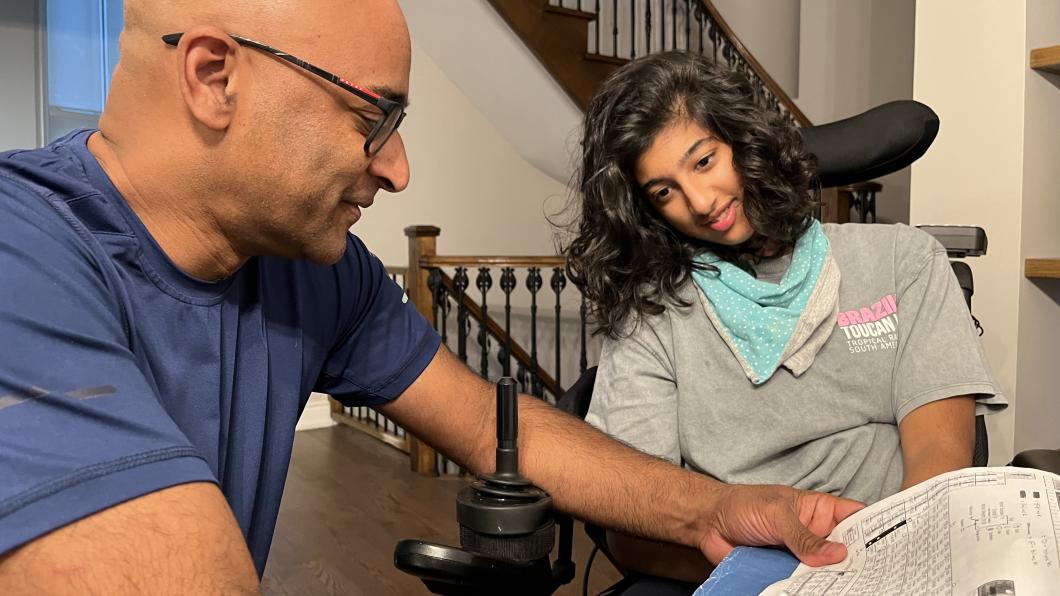
My daughter never had homework. Now, at age 15, she does
By Anchel Krishna
My daughter Syona has never had homework.
That might sound strange for a teenager, but school has always been a little different for her. Syona has cerebral palsy and has had an Individual Education Plan (IEP) since she started school. Her learning has been designed around her needs and pace, not around worksheets or tests.
Until this semester.
Now she’s taking a locally developed science course for credit and has daily homework for the first time. The kind that requires us to gather around the kitchen table and work through it together. Dilip, my husband, is the more natural teacher in our home, and he often teams up with Syona to help her with homework in the evenings.
As the weeks progress, I've realized that this is a "typical" teen routine. But it’s new territory for her, and for us. Our first challenge is to remember that there is daily homework, but Syona is good at reminding us.
The homework itself isn’t complicated, but it is consistent. Every night there’s a small task, like reviewing notes, filling in a chart or answering questions.
One night, her assignment was about the changes of state. She had to describe how the state of water changes when it melts and freezes. So we grabbed a few ice cubes from the freezer, put them in her hand and sat together feeling them melt. She noticed that they changed from a solid, hard state to a liquid state. She also noticed how temperature influenced that change. We used her observations to fill in the answers in a chart.
That simple exercise was brilliant for Syona because it was hands-on: she could feel the concept.
Lessons that rely solely on visual observation are difficult for Syona due to her cortical visual impairment (CVI). CVI is a visual processing disorder that impacts how her brain interprets what she sees. Her eyes work, but her brain doesn’t always process the images to understand what she is seeing.
In addition, what she can process changes moment to moment based on a myriad of factors like distraction, fatigue or complex surroundings.
Also, standard lessons that involve identifying parts of a diagram or watching a demonstration are challenging. If it's a topic that's outside Syona's personal experience, it's even harder to make sense of what she's looking at, because she doesn’t have a library of images in her mind to draw from.
For science in particular, Syona has to work much harder to connect abstract or visual information to what she already knows. She listens carefully, uses context and relies on verbal explanations. But even then, it’s a lot to process.
Her teachers and EAs have been incredible, patient, creative and encouraging. They help break down concepts, provide alternate ways to show understanding and celebrate effort as much as outcomes. But still, there are moments when it’s hard.
Recently, Syona had a few tests that didn’t go as she'd hoped. She studied. She reviewed her notes. We went through questions together. We felt she was ready.
But when the tests came back, the marks were lower than she expected. And Syona was upset. Lip quivering, on the verge of tears, upset.
We talked through the fact that sometimes even when you try, the outcome won’t be what you want. I shared about how math was always tricky for me, and Dilip talked about his struggles with French class.
It's not an easy message to understand when you’ve worked so hard and still come up short. But it’s a valuable one. It’s a reminder that success in our world can be measured in outcomes, but effort, curiosity and trying again after disappointment matter a lot, too. For Syona, maybe the real lesson is that not every subject is going to be a strength and that’s okay.
This new rhythm of nightly homework and intellectual challenge is showing us another kind of growth. Ours. What surprises me most is how normal this all feels. The evening work, the reminders to stay focused, the quiet victories when she gets an answer right. These are the moments that so many families take for granted, but for us, they are a first. They remind me that typical doesn’t necessarily mean boring or unimportant. It can be deeply meaningful when it arrives at a different time and in a different way.
Homework was never something I imagined celebrating. But here we are, 15 years in, treating it like a milestone. Because for Syona, it is.

Like this content? Sign up for our monthly BLOOM e-letter, follow BLOOM editor @LouiseKinross on X, or @louisekinross.bsky.social on Bluesky, or watch our A Family Like Mine video series.